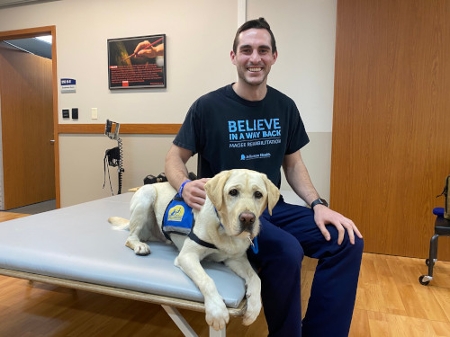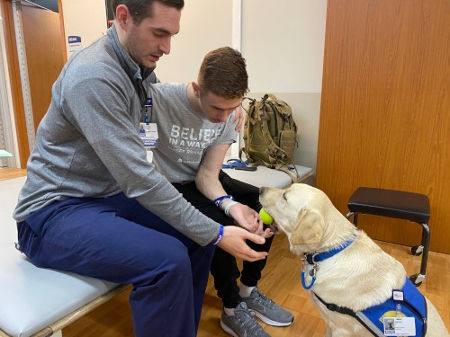Every Day is "Bring Your Dog To Work Day" for OT Grad

When Peter DeLong, '14, G'15, works with patients at Magee Rehabilitation Hospital in Philadelphia, the occupational therapist has an unexpected sidekick -- his dog, Nigel.
A labrador / golden retriever mix, Nigel is a trained assistance dog who works alongside DeLong as he helps patients regain their mobility after injury or surgery. DeLong works mainly in the spinal cord injury unit at Magee, but he and Nigel also work throughout the hospital and at Magee's outpatient locations in the Philadelphia area.
"I co-treat with occupational therapy, speech therapy, physical therapy, and recreational therapy, and we utilize Nigel as a modality to improve patient engagement and meet goals, while having them engaged in a more playful and fun experience with the dog," DeLong says.
With Nigel around, DeLong has found patients are more engaged in their therapy, and in some cases, less anxious or fearful. While the dog's presence alone is helpful, he's also highly skilled.

Rigorous Training
DeLong adopted Nigel from Canine Companions for Independence, an organization that trains and provides assistance dogs for therapy practitioners and people with disabilities. Nigel was in training for over a year before he matched with DeLong. Then, they completed a rigorous two-week training program together.
Nigel knows 45 different commands that are used during therapy sessions. Some patients, for instance, need to work on balance in their recovery, so they can stand up to dress themselves. DeLong trained Nigel to nudge the patients with his nose, using a bit more force each time, while they try to stay upright.
“That’s always a funny one,” DeLong says, because even after explaining the exercise to the patients, “the first time Nigel does it, they always are just in shock. They start laughing, which is fun, because with a lot of these people, just to see them smile and laugh is a great sign.”
Perfect Timing
DeLong started working at Magee right after graduation. Scranton connections helped him land the job. He had completed a three-month clinical experience at Magee, and was able to turn that into a job offer. Now he is on a team that includes eight other graduates of Scranton's occupational therapy program.
When DeLong joined the team, another Scranton graduate was spearheading the facility dog program at Magee. DeLong was able to see firsthand how an assistance dog benefited patients, and what owning an assistance dog entailed.
He got on the waiting list for an assistance dog of his own. After eight months, a spot opened up in the training. The timing was perfect, as the other therapist with an assistance dog had moved away, and all dogs stay with their handler.
Magee was without a dog, and DeLong was ready to step up.
Engaging with Patients Creatively
He'd first encountered assistance dogs as an undergraduate at Scranton, participating in the occupational therapy department's annual fundraiser for an organization that provides assistance dogs.
Plus, he says the faculty encouraged students to think creatively about how to engage with their patients, so it was a natural progression to get involved in dog-assisted therapy.
"They were always supportive of us looking at things from a different scope, to see how we might be more creative with therapy. It's not cookie cutter," DeLong says. "(My time at Scranton) is the basis on which everything was built."
Editor's note: DeLong is one of several Scranton OT graduates working at Magee Rehabilitation. The hospital has hired alumni of the department for many years.